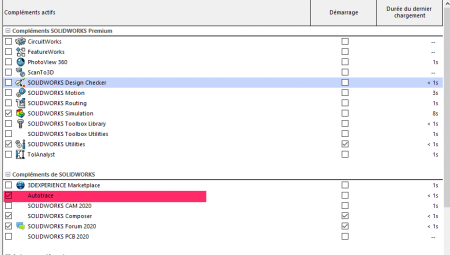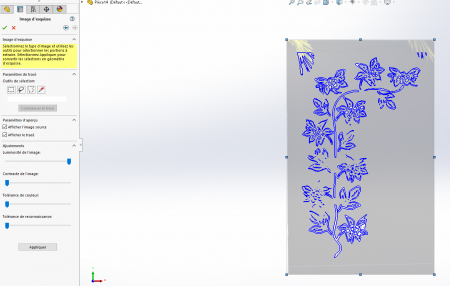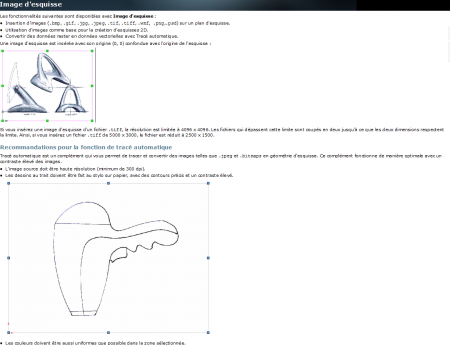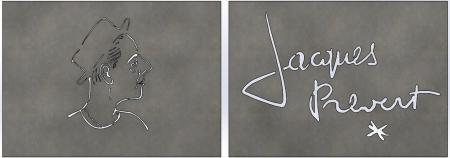Hello colleagues,
I received two photos from a friend to make the DXF for the cutting of the patterns but after a few hours I have nothing conclusive.
I post the photos in case someone is luckier than me
dsc_0274.jpg
dsc_0275.jpg
Hello colleagues,
I received two photos from a friend to make the DXF for the cutting of the patterns but after a few hours I have nothing conclusive.
I post the photos in case someone is luckier than me
dsc_0274.jpg
dsc_0275.jpg
It depends a lot on the quality of the photo, if possible take the same photos with one or more sheets taped to the back part. This should make the task much easier. Because with photos, between reflections and color gradients, it does become complicated.
Hello
Quickly do it with Inkscape (Path / vectorize a raster image) if you have W10 it's available under the Microsoft store.
I should spend more time on it (more passing) and if possible have a better image quality.

@sbadenis, that's the 1st thing I told him when I received the photos, but the problem is that the photos were taken at a private home in Corsica and we are in Alsace :-(
@franck.ceroux, I had more or less the same result with other software
Using Gimp (free) to accentuate the contrast:
https://formation-logiciel-libre.com/gimp-detourage-par-contraste-avec-un-masque-de-calque/
Then via another software to recover the profile.
Otherwise you get paid for the trip to Corsica, but of course you take your own camera!
Or choose an image more or less close to the photos and already vectorized or in dxf:
https://www.google.com/search?q=image+dxf+fleur&client=firefox-b-d&tbm=isch&source=iu&ictx=1&fir=SAFYM2veNjBM3M%252CgAJmA6z9HbhWRM%252C_%253BhaZsYNFOMegIYM%252CdIrgxP1Hc78btM%252C_%253BxqKy3uFE-iduHM%252CFVa7HRGa0zBt4M%252C_%253BA-7qkaMX6TCiWM%252C6R0ZJycLwzAVAM%252C_%253BsPeEns9J1iksCM%252Cka4Lbbru2dL4_M%252C_%253BAfUnmJ63cw3K1M%252CRegsHkxqX9x7QM%252C_%253BdCPk2cM-UM4CCM%252CeoI_Lnz9oMmYmM%252C_%253BfjlCaRW4xR3t9M%252CKgLOFStrHm3QEM%252C_%253B5wbtJSkI4k7AZM%252CM4cET8HIDHT7dM%252C_%253By8eDJJrDzAUfJM%252CfYbO-QIKnIEs9M%252C_%253Bf-1YE0beL5JPsM%252CiazqpxXVxaGyfM%252C_%253BLV9V9yAIJbR8FM%252CRegsHkxqX9x7QM%252C_%253BuDuSruk-HgjcoM%252CZTsqnR3vpPL3uM%252C_%253BE-0Z0jdab5tT_M%252CO7lbn9WvJMeQTM%252C_&vet=1&usg=AI4_-kTWGpZQgAlOa4G1TGzfYXBVd9T_qw&sa=X&ved=2ahUKEwjx-vmbwKT0AhVM4YUKHbcFDuoQ9QF6BAgWEAE#imgrc=haZsYNFOMegIYM
Hello@tous
maybe not the right method but with this image quality and unless you are an expert or use a CIA tool ;) I think you will have to redraw (attachment in SW18), given that the pattern is repetitive it must not be as complicated as it seems,
You can try with the Solidworks "autotrace" function to enable in add-ins




Hello
I attempted to capture the image and redefine the fill to black.
As said before, the quality of the photo does not allow you to crop the image correctly (neither with Autotrace nor with other software), but this is not the most restrictive thing.
It depends on the cutting tool (plasma, laser, water, etc.), there are conditions of distance between two areas (for example, for our plasma, we need 3mm), but in this bouquet, the voids are sometimes very close.
Another constraint is that spline is not recognized for the conversion of our plasma into dxf . The dxf ext correctly translated, however the machine refuses to process this stroke which has just been broken down into a large quantity of small strokes. So, you have to plan to redraw with circles, fittings, straight lines.

Good luck
Lou